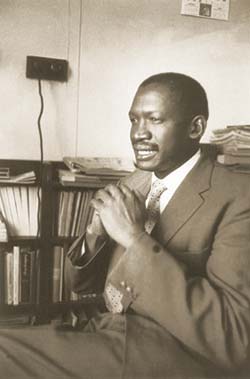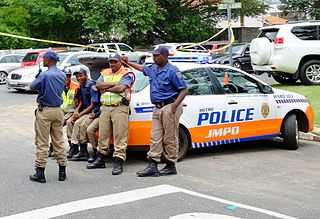
House arrest is a legal measure where a person is required to remain at their residence under supervision, typically as an alternative to imprisonment. The person is confined by the authorities to their residence. Travel is usually restricted and may require prior approval.
A citizen's arrest is an arrest made by a private citizen – a person who is not acting as a sworn law-enforcement official. In common law jurisdictions, the practice dates back to medieval England and the English common law, in which sheriffs encouraged ordinary citizens to help apprehend law breakers.

Robert Mangaliso Sobukwe OMSG was a South African anti-apartheid revolutionary and founding member of the Pan Africanist Congress (PAC), serving as the first president of the organization.

The Anti-terrorism, Crime and Security Act 2001 is an Act of Parliament of the United Kingdom, formally introduced into Parliament on 19 November 2001, two months after the terrorist attacks in the United States on 11 September. It received royal assent and came into force on 14 December 2001. Many of its measures are not specifically related to terrorism, and a Parliamentary committee was critical of the swift timetable for such a long bill including non-emergency measures.

The Prevention of Terrorism Act 2005 was an Act of the Parliament of the United Kingdom, intended to deal with the Law Lords' ruling of 16 December 2004 that the detention without trial of eight foreigners at HM Prison Belmarsh under Part 4 of the Anti-terrorism, Crime and Security Act 2001 was unlawful, being incompatible with European human rights laws.

The Terrorism Act No 83 of 1967 was a law of the South African Apartheid regime that was put in place to respond to violent resistant from people, groups and officials that the apartheid regime opposed. It categorized participation in any form of terrorist activity as a capital crime. The act was repealed with the implementation of the Internal Security Act of 1982; however, Section 7 remained in effect.
The Internal Security Act 1960 was a preventive detention law in force in Malaysia. The legislation was enacted after the Federation of Malaya gained independence from Britain in 1957. The ISA allows for detention without trial or criminal charges under limited, legally defined circumstances. On 15 September 2011, the Prime Minister of Malaysia, Najib Razak said that this legislation will be repealed and replaced by two new laws. The ISA was replaced and repealed by the Security Offences Act 2012 which has been passed by Parliament and given the royal assent on 18 June 2012. The Act came into force on 31 July 2012.
Preventive detention is an imprisonment that is putatively justified for non-punitive purposes, most often to prevent further criminal acts.

the The Terrorism Act 2006 is an act of the Parliament of the United Kingdom that received royal assent on 30 March 2006, after being introduced on 12 October 2005. The Act creates new offences related to terrorism and amends existing ones. The Act was drafted in the aftermath of the 7 July 2005 London bombings, and some of its terms have proven to be highly controversial. The government considered the act a necessary response to an unparalleled terrorist threat; it has encountered opposition from those who feel that it is an undue imposition on civil liberties, and could increase the terrorism risk.
Anti-terrorism legislation are laws aimed at fighting terrorism. They usually, if not always, follow specific bombings or assassinations. Anti-terrorism legislation usually includes specific amendments allowing the state to bypass its own legislation when fighting terrorism-related crimes, under alleged grounds of necessity.
From 2000 to 2015, the British Parliament passed a series of Terrorism Acts that were aimed at terrorism in general, rather than specifically focused on terrorism related to Northern Ireland.
The African Resistance Movement (ARM) was a militant anti-apartheid resistance movement, which operated in South Africa during the early and mid-1960s. It was founded in 1960, as the National Committee of Liberation (NCL), by members of South Africa's Liberal Party, which advocated the dismantling of apartheid and gradually transforming South Africa into a free multiracial society. It was renamed "African Resistance Movement" in 1964.

The system of racial segregation and oppression in South Africa known as apartheid was implemented and enforced by many acts and other laws. This legislation served to institutionalize racial discrimination and the dominance by white people over people of other races. While the bulk of this legislation was enacted after the election of the National Party government in 1948, it was preceded by discriminatory legislation enacted under earlier British and Afrikaner governments. Apartheid is distinguished from segregation in other countries by the systematic way in which it was formalized in law.
The term aggravated felony was used in the United States immigration law to refer to a broad category of criminal offenses that carry certain severe consequences for aliens seeking asylum, legal permanent resident status, citizenship, or avoidance of deportation proceedings. Anyone convicted of an aggravated felony and removed from the United States "must remain outside of the United States for twenty consecutive years from the deportation date before he or she is eligible to re-enter the United States." The supreme court ruled 5-4 in Sessions v. Dimaya that the residual clause was unconstitutionally vague limiting the term.

Law enforcement in South Africa is primarily the responsibility of the South African Police Service (SAPS), South Africa's national police force. SAPS is responsible for investigating crime and security throughout the country. The "national police force is crucial for the safety of South Africa's citizens" and was established in accordance with the provisions of Section 205 of the Constitution of South Africa.

Pre-trial detention, also known as jail, preventive detention, provisional detention, or remand, is the process of detaining a person until their trial after they have been arrested and charged with an offence. A person who is on remand is held in a prison or detention centre or held under house arrest. Varying terminology is used, but "remand" is generally used in common law jurisdictions and "preventive detention" elsewhere. However, in the United States, "remand" is rare except in official documents and "jail" is instead the main terminology. Detention before charge is commonly referred to as custody and continued detention after conviction is referred to as imprisonment.
Indefinite detention is the incarceration of an arrested person by a national government or law enforcement agency for an indefinite amount of time without a trial. The Human Rights Watch considers this practice as violating national and international laws, particularly human rights laws, although it remains in legislation in various liberal democracies.
Zadvydas v. Davis, 533 U.S. 678 (2001), was a case decided by the Supreme Court of the United States. The court ruled that the plenary power doctrine does not authorize the indefinite detention of immigrants under order of deportation whom no other country will accept. To justify detention of immigrants for a period longer than six months, the government was required to show removal in the foreseeable future or special circumstances.

In 1953, the Public Safety Act was enacted by the apartheid South African government. This Act empowered the government to declare stringent states of emergency and increased penalties for protesting against or supporting the repeal of a law.

The Internal Security Act, 1982 was an act of the Parliament of South Africa that consolidated and replaced various earlier pieces of security legislation, including the Suppression of Communism Act, 1950, parts of the Riotous Assemblies Act, 1956, the Unlawful Organizations Act, 1960 and the Terrorism Act, 1967. It gave the apartheid government broad powers to ban or restrict organisations, publications, people and public gatherings, and to detain people without trial. The Act was passed as a consequence of the recommendations of the Rabie Commission, which had enquired into the state of security legislation.







